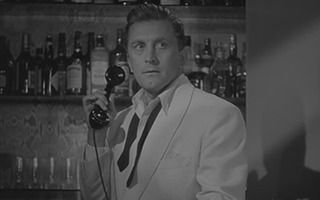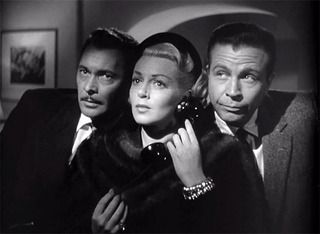
The Bad and the Beautiful
1952
Director: Vincente Minnelli
Starring: Kirk Douglas, Lana Turner, Dick Powell, Barry Sullivan, Walter Pidgeon, Gloria Grahame
It’s pretty astounding to me that a film like The Bad and the Beautiful actually got made in Hollywood, let alone made in Hollywood during the 1950s, let alone made in Hollywood during the 1950s and starring some of the most famous names of the time. The Bad and the Beautiful is a searing and unflinching look at the brutality of the film industry and the kind of ruthlessness that is needed to make it in show business.
Told in flashback, three Hollywood big wigs – actress Georgia Lorrison (Turner), screenwriter James Bartlow (Powell) and director Fred Amiel (Sullivan) – are called together by producer Harry Pebbel (Pidgeon). Pebbel asks them to consider, for old times’ sake, making one more picture with producer Jonathan Shields (Douglas). Each of them then remembers their involvement with Shields and what he did to each of them to make them hate his guts.
I love how mean this film is, because damn, it’s mean. Jonathan Shields is not a nice person. He is beyond driven, and willing to go to any measure to make his films. All three of the stories told over the course of the film involve Shields befriending the person in question (or, in the case of Lana Turner’s character, seducing), then using his relationship with that person to get films made – at any cost. Douglas’ performance, and the film in general, is incredibly brave. Douglas doesn’t just tiptoe near the edge of ego-driven megalomania, he careens straight to the cliff and soars right over it. There are absolutely no attempts to make Shields a hero. He is not. But he is the star of the film, and there is something oddly captivating about him. As horrid as he is, I can understand how the actress, the screenwriter, and the director all got taken in by him. Douglas as Shields is incredibly charismatic.

The film is tremendously self-referential to the Hollywood legends and lore of the time. The most obvious one to me was the making of a film by Shields called “The Doom of the Cat Man,” which becomes a thinly veiled reference to Jacques Tourneur’s Cat People. Turner’s character, Georgia Lorrison, is an alcoholic daughter of a dead alcoholic acting legend, in the same vein as the Barrymore family. And Shields himself is apparently a caricature of David O. Selznick, especially when he fires the director of a Civil War epic and just winds up directing the damn thing himself *cough Gone With the Wind cough* These are the most obvious references, but the film has many, many more. The more you know about Classic Hollywood, the more each character and each vignette matches up. (Although I can’t help but wonder if this film had been made ten years later, there would have been something in there somewhere about a closeted gay film director who is married to the biggest musical star of the time…)
Given these incredibly broad and obvious references to people and films that were still very much in the public eye, the ruthlessness of the main character is even more satisfying. There is a horrible whiff of truth about this film. I watch this and think, “Is that really what Hollywood is like?” Then I remember that the tag of the film should be “Based on a true story.”
Minnelli’s visuals are, as ever, gorgeous and sumptuous. Although I’m more familiar with his color work, his eye for black and white contrast is beautiful. I love how he pulls his camera back in the sequences where films were being shot to show not the actors and actresses, but the crane operator, the script girl, the makeup artist. The story of the film is bitter, but Minnelli’s love for Hollywood shines through in certain scenes. It’s as if Minnelli is saying, “This is the business; rough sometimes, but I can’t help myself, I love it so!”
All the performances in this film are top notch. Douglas dominates, as he must, given the story, but he is countered by strong turns from everyone else. I typically find Lana Turner rather boring, but here she carries herself very well. She is most interesting before her character’s rise to fame, when she is a down and out alcoholic slut trying to drink away her memories of her father. Dick Powell, an actor I enjoy in musicals and films noir, is once more incredibly enjoyable as a laconic screenwriter who starts off hating Shields and comes full circle. Gloria Grahame has a small role as his wife, a giddy, flirty, silly Southern belle. Needless to say, she steals every scene she’s in. Apparently, Grahame made this film as her career was rising, and it’s easy to see how her performance led to other, more substantial roles. There is a frank sexuality between Powell and Grahame that I didn’t expect in the movie, but fits well.

Easily the best thing about the film, however, is the plot, and what I find most fascinating is actually not Shields, but the three people who he tread on. They are all incredibly angry at him, and yet they agree to listen to Pebbel’s plea to make another film with him. They are all drawn back to Shields. They cannot keep away from him. In all three of their tales, Shields put his own personal career before not only their career, but their personal life as well. He has been wretched to them, and yet they think about the possibility of getting back into bed with him. What does it say about these people, then? I would hesitate to call them victims; I would more likely call them masochists. They are hardly innocent flowers themselves. Apparently, in Hollywood, even the victims are evil.
I find films about Hollywood fascinating. Singin’ In The Rain, Day for Night, The Player, Sunset Blvd, these are all favorites of mine. The Bad and the Beautiful easily joins the ranks of those greats. It fits right in.
Arbitrary Rating: 9/10
This is a powerful film. In retrospect, it's one I wish I'd seen before I saw The Player. It's such a harsh skewering of Hollywood and of the people that it's hard to have sympathy for anyone involved. I see this as more of a character study than a plotted film, but it's a great character to study.
ReplyDeleteI actually can't remember which I saw first, this or The Player, but they would make a great double feature. For being a mainstream film when it was made, this is downright searing.
ReplyDeleteRe: the plot, I guess I didn't mean plot, but more how everyone else responds to the character of Shields. Not just what he does, but just how telling everyone's response is.
From everything I've heard, it wasn't exactly challenging for Kirk Douglas to play a raging megalomaniac.
Good review. If you haven't seen it yet, Douglas gets to play another big, brash, unlikable character in Ace in the Hole.
ReplyDeleteYES, I've seen that one, but not in awhile. If I remember correctly, he goes even farther off the deep end in that film! Douglas does that sort of character so, so well.
Delete